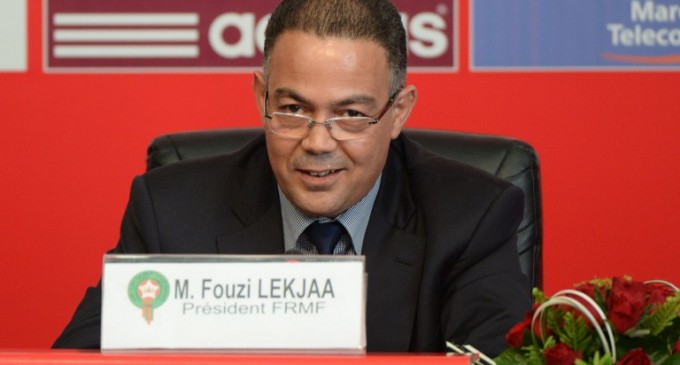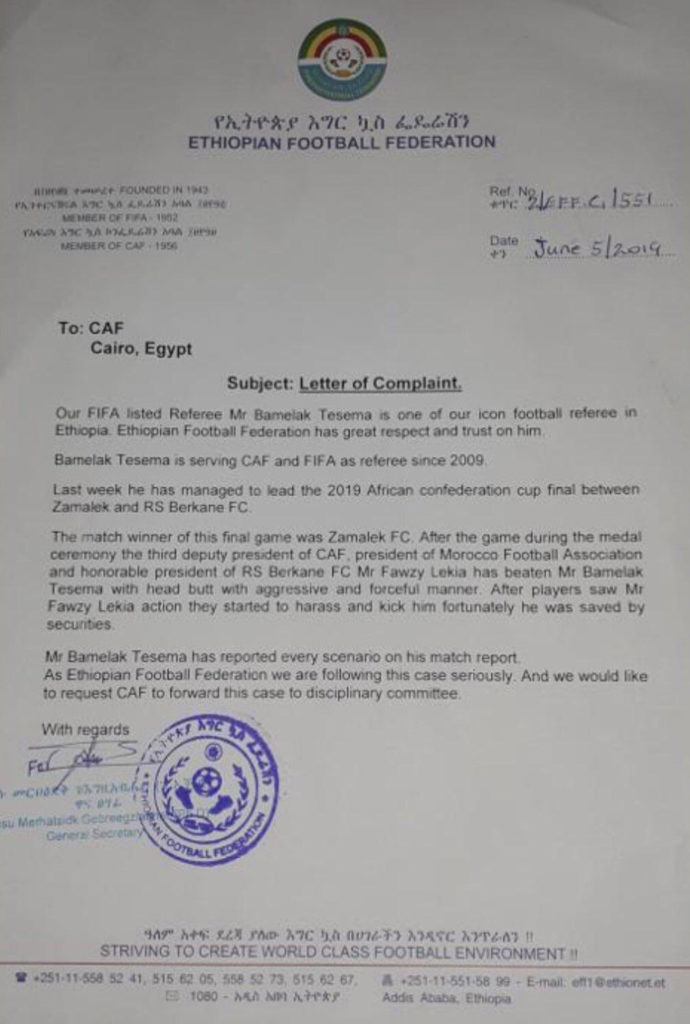By Paul Nicholson
August 6 – Moroccan FA president Fouzi Lekjaa, who allegedly head-butted Ethiopian referee Bamlak Tessema after the second leg of the CAF Confederation Cup final between RS Berkane and Zamalek, has had the charges against him of assault dismissed, despite eye witnesses being present.
It is a remarkable reprieve for Lekjaa who in July was elevated to first vice president status at the Confederation of African Football’s (CAF) general assembly.
The case was dismissed by CAF on the basis that the “Disciplinary Board decided that there is insufficient solid and corroborated evidence to prove the culpability of Fouzi Lekjaa.”
Eye witness reports had confirmed that Lekjaa had head-butted Tessema and while he withdrew his initial complaint and sent a letter to Lekjaa forgiving him for the assault, the Ethiopian FA nevertheless had filed their own complaint (see letter below).
One CAF executive committee member told Insideworldfootball on July 10 (following a Dsiciplinary Committee meeting in which Lekjaa’s case was handed back to CAF) said: “In my opinion – and the opinion of the objective public – the facts, in the case of Fouzi, were very clear. A firm decision should have been taken. We are turning ourselves into a laughing stock and this is doing terrible damage to our credibility, as a governing body.”
The reporting of the dismissal of the case shows where the Disciplinary Body found wriggle room to find in favour of Lekjaa, saying: “The Match Commissioner Gustavo Ndong Edu, indicated that some players and officials of RS Berkane confronted the referee and other match officials. Based on testimonies and official reports, the Disciplinary Board established ambiguities in the reports regarding the incident and the alleged culprit.”
So, essentially, a confrontation did take place but the full extent of the violence is disputed. The fact that a less than civilised confrontation took place seems to have been overlooked in the judgement.
It is a judgement that has been a long time coming and raises – yet again – questions over CAF’s governance and application of its rules. It also raises significant questions over when and how this decision was taken as the CAF made the announcement within “a summary of the decisions of the CAF Disciplinary Board at its meeting on 3 July 2019 in Cairo, Egypt.”
It is unclear how that the decision could have been made July 3 when the Disciplinary Committee did not formally consider the case until six days later.
On July 9, in a private communication to the CAF secretariat, the Disciplinary Committee said its integrity and capacity to deliver a verdict had been “compromised”, which compelled it to withdraw from hearing the case involving Lekjaa (he had failed to turn up to his hearing).
After the Disciplinary Committee, chaired by Raymond Hack, lawyer and former CEO of the South African Football Association, concluded its deliberations, a decision was initially made to suspend Lekjaa for one year.
But after the Disciplinary Committee communicated its decision to the CAF Secretariat, Mouad Hadji, the organisation’s Secretary-General, informed the DC that Lekjaa had informed him of illness, claiming that he had undergone a bout of food poisoning and was unable to attend the hearing, which is reportedly the second time that Lekjaa had failed to so do.
Sources indicate that Mouad claimed he had long received the information from Lekjaa but had “forgotten” to pass it on to the DC, before their July 9 hearing began. Mouad was an aide of Lekjaa, at the FRMF, before his CAF appointment.
“We never received any notice that Lekjaa was sick, before we began our hearings, so how are we supposed to deal with the fact that we are only getting this information from the secretariat, well after we had delivered our verdict?” a CAF source, who declined to be named, told Insideworldfootball’s Osasu Obayiuwana July 9.
“Bearing in mind that we have an obligation to hear all the parties, it left us in an embarrassing and impossible position. There was no way that we, as a disciplinary committee, could continue with this case after that strange notification from the secretariat.
“There was a unanimous decision, by all members of the committee, to hand this case back to the CAF administration, who could reassign the case to another competent body,” he said.
CAF is fast gaining a reputation for institutionalised sexual harassment (there has still been no word regarding the investigation into the multiple allegations against its president Ahmad) and now it appears it can add institutionalised violence to its skillset.
FIFA general secretary Fatma Samoura, parachuted in amongst much controversy and discontent to take control of African football, may need more than a rule book (one hopes she has taken one and has read it closely herself) to safely conduct her task. African football and the wider football world is watching for the next instalment on this soap opera that verging on the boundaries of psychological and now violent horror thriller.
Contact the writer of this story at moc.l1745645444labto1745645444ofdlr1745645444owedi1745645444sni@n1745645444osloh1745645444cin.l1745645444uap1745645444


